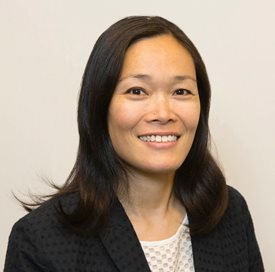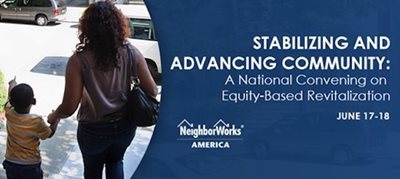Across the country, Asian Americans report feeling fear of threats or physical attacks – 32%, according to an April report from Pew Charitable Trusts. The vast majority of Asian adults say violence against them is rising. In New York, Asian Americans for Equality (AAFE), a NeighborWorks network organization, is working on ways to keep the community safe.
"It's been especially hard on the senior population," says Jennifer Sun, co-executive director of AAFE. "There's a heightened sense of fear just going about their daily lives outdoors. They're not as confident going on the subway to visit friends and family members or even doing their daily grocery shopping. Fear is isolating, and the prolonged isolation will deny seniors the health benefits of vaccination, social interaction and exercise."
"There's a heightened sense of fear just going about their daily lives outdoors. They're not as confident going on the subway to visit friends and family members or even doing their daily grocery shopping. Fear is isolating, and the prolonged isolation will deny seniors the health benefits of vaccination, social interaction and exercise."
 "There's a heightened sense of fear just going about their daily lives outdoors. They're not as confident going on the subway to visit friends and family members or even doing their daily grocery shopping. Fear is isolating, and the prolonged isolation will deny seniors the health benefits of vaccination, social interaction and exercise."
"There's a heightened sense of fear just going about their daily lives outdoors. They're not as confident going on the subway to visit friends and family members or even doing their daily grocery shopping. Fear is isolating, and the prolonged isolation will deny seniors the health benefits of vaccination, social interaction and exercise."Sun will share her observations, along with some of AAFE's solutions, as part of "Working Toward Safer AAPI Communities," a panel discussion to be held June 17 during NeighborWorks America's upcoming online training event, "Stabilizing and Advancing Community: A National Convening on Equity-Based Revitalization." The panel will be moderated by Lisa Hasegawa, NeighborWorks' regional vice president for the Western Region. It features executive directors and organizers from four other nonprofits, including two NeighborWorks network organizations, all working on solutions.
Getting to daily jobs has been a constant worry for AAFE residents in New York, Sun recounts, adding that AAFE was recently approached by the garment industry after Asian American factory workers were repeatedly assaulted on their way to work. In response, factories altered shifts, allowing workers to leave during daylight, and encouraged workers to leave in groups. AAFE is working with them on other safety improvements.
 Young people have also been affected. AAFE runs an afterschool program for immigrant high school students, and Sun says that when families choose between students staying remote or returning to school in person, most Asian American families keep the kids at home. "There is a deep reluctance from parents on their children going back to school," she says. It isn't just the pandemic, she emphasizes; it's the fear their children will be assaulted or verbally abused, contributing to almost 70% of Asian students in the city choosing to continue remote learning. The numbers are high nationwide.
Young people have also been affected. AAFE runs an afterschool program for immigrant high school students, and Sun says that when families choose between students staying remote or returning to school in person, most Asian American families keep the kids at home. "There is a deep reluctance from parents on their children going back to school," she says. It isn't just the pandemic, she emphasizes; it's the fear their children will be assaulted or verbally abused, contributing to almost 70% of Asian students in the city choosing to continue remote learning. The numbers are high nationwide. "As vaccinations reach more of the population, the rest of the city is feeling sense of hope and freedom," Sun says. "We're feeling the exact opposite." AAFE's work to change that includes:
• Re-establishing relationships with neighbors. AAFE is in the planning stage of creating a safe-haven program, enlisting neighborhood businesses to serve as safe havens for Asian residents who might be experiencing harassment. Like a program to help keep school kids safe in the 1980s, businesses would put recognizable signs in their windows, identifying them as places of refuge. Businesses would also receive bystander training on how to help victims. The program would be paired with volunteer efforts to provide walking companions between the subway and final destination.
• Personal alarms. AAFE has partnered with Grace Young, a cookbook author and food historian, and Bank of America, to raise more than $20,000 for personal safety alarms to be distributed to Chinatown seniors, small business owners and their workers. The Safe with Sound initiative would allow residents to overcome language barriers and show something's wrong by using a personal alarm to draw attention with lights and sound.
• Outdoor spaces. AAFE is working to start monthly or bimonthly cultural programming for Forsyth Plaza, an outdoor space in Chinatown. The site will see film, art, puppetry and more, and give people a chance to be together, celebrate, and take back spaces.
• Video cameras. The nonprofit is trying to make sure that the video cameras installed in neighborhoods near businesses are functioning.
• Upstander and self-defense training. AAFE is partnering with organizations to offer "upstander" and self-defense training. Upstanders are trained in the five D's of intervention: Distract, Delegate, Document, Delay and Direct.
Registration for the training event, which will be held June 17-18, is already open.
Registration for the training event, which will be held June 17-18, is already open.

